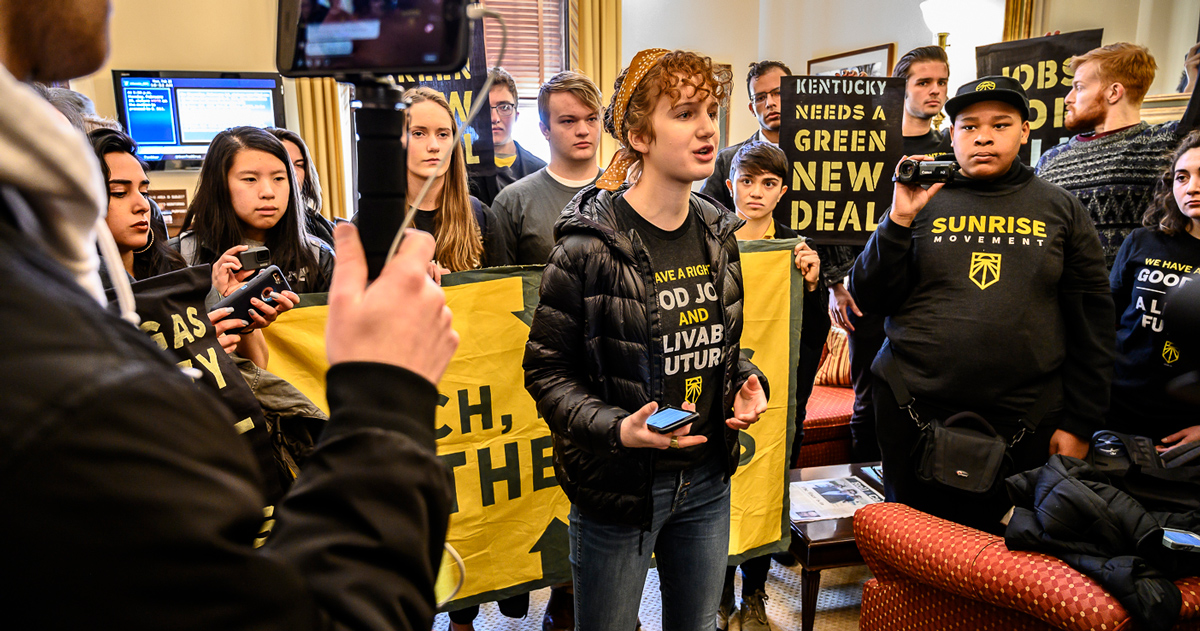How Movements Moved the Debates - 5 minutes read
 How Movements Moved the Debates
How Movements Moved the DebatesFor the second night in a row, a set of 2020 Democratic presidential hopefuls took the stage to mouth platitudes and canned, focus-grouped lines. Though much of what they said was either forgettable or inane, there were a few memorable moments—in particular, Joe Biden’s defense of his opposition to desegregation and his feigned ignorance of the fact that the administration in which he served deported some 3 million people. The MSNBC moderators, for their part, acted like surrogates of the Cato Institute, peppering the candidates with an endless chorus of “but how will you pay for that?”
Despite the knee-jerk conservatism of Lester Holt and company, their questions also made evident, even if inadvertently, the tremendous power of social movements. Indeed, the TV spectacle of the debates is in many ways a sideshow to the real drama of politics, which happens where the movements are—in the streets.
Almost all of the questions the candidates faced—on subjects from economic inequality to the climate crisis, from abortion and women’s rights to affordable healthcare, anti-black racism, the lessons of the Iraq War, and immigration—were made possible by mass movements of ordinary people fighting entrenched power and monied interests: Occupy Wall Street, Black Lives Matter, #MeToo, the DREAMers, the youth-led climate movement, to name only a few. If there is one thing that the debates made clear, it is that movements lead, politicians follow.
And the debates come at a time when the Democratic Party’s base is in tremendous motion—a reality that could be felt, if not seen, on the stage in Florida. Just this week, a coalition of anti-carceral activists, Black Lives Matter, the Working Families Party, the Democratic Socialists of America, and local organizers helped thirty-one-year-old public defender Tiffany Cabán win an election for Queens district attorney, defeating Melinda Katz, the candidate of the borough’s political machine backed by big-money real estate. Cabán’s successful campaign has placed a bold, progressive agenda to end mass incarceration in the national spotlight and promises dramatic changes to the criminal-legal system in one of the country’s most populous counties.
Young activists from the Sunrise climate movement have spent days camped outside the DNC headquarters in Washington, D.C., demanding a debate on how to mitigate the threats posed by climate change. And though Wednesday and Thursday’s debates devoted just a few minutes to the greatest crisis facing humanity, the sense of urgency was palpable, in large part due to the work of Sunrise and other climate activists.
In Boston, hundreds of people employed by the home furnishings company Wayfair walked off the job on Wednesday to protest the company’s sale of supplies to a government contractor operating detention camps for children at the country’s southern border. Thanks to the steadfastness of immigrant rights activists, there was a broad consensus on the debate stage that the undocumented should not be treated as criminals.
Across a range of issues and around the country, progressive activists are working, fighting, to realize a political vision that goes far beyond replacing Trump and returning to a sense of normalcy, to a state of affairs that was always an emergency for some—and that, if restored, would be disastrous for all.
Every single candidate would, if elected, have to be pushed and pressured by these very movements. Some, of course, more than others. That no political change happens without a fight is a fact that only a few candidates—Sanders and, perhaps surprisingly, Williamson among them—appear to understand. But there should be no illusions: even a Sanders presidency would require sit-ins and struggle, confrontation and conflict, to hold his administration accountable to the people who put him in power.
Defeating Donald Trump in 2020 is no doubt paramount, and the gravity of this task should serve as a countervailing force to the vapidity of the horserace and personality contest to which TV news has long reduced politics. Yet Trump’s defeat, even by one of the less corrupt and mendacious Democrats, would not be the end of the fight. It would be the start of a more important one.
Joshua Leifer is an associate editor at Dissent.
Source: Dissentmagazine.org
Powered by NewsAPI.org
Keywords:
Democracy • Joe Biden • Racial segregation • MSNBC • Surrogacy • Cato Institute • Conservatism • Lester Holt • Social movement • Politics • Economic inequality • Global warming • Abortion • Women's rights • Health care • Racism • Iraq War • Occupy Wall Street • Black Lives Matter • Climate movement • Democratic Party (United States) • Florida • Coalition • Activism • Black Lives Matter • Working Families Party • Democratic Socialists of America • Local government in the United States • Public defender • United States presidential election, 2016 • Queens • District attorney • Melinda Katz • Borough (New York City) • Political machine • Real estate • Incarceration in the United States • Climate movement • Democratic National Committee • Washington, D.C. • Global warming • Boston • Wayfair • Employment • Prison • Immigration • Activism • Consensus decision-making • Crime • Nation state • Progressivism • Politics • Social movement • Bernie Sanders • Bernie Sanders • Presidency of George W. Bush • Sit-in • War • Presidency of George W. Bush • Donald Trump • Politics • Donald Trump • Political corruption • Deception • Democracy •